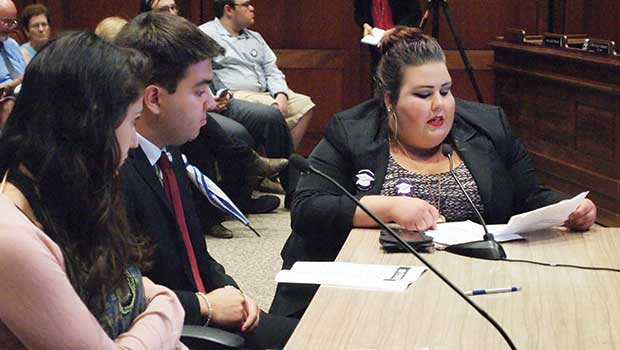
Imagine this: getting up at 5 a.m. to do laundry, get your kids dressed and fed and off to school or day care, then heading out for a day’s work — and, at 7 p.m., turning up to community college for two and a half hours of study. Professor Sandra Howland said that is the common experience for students in her English as a Second Language class at North Shore Community College, where nearly all members of the class work exhausting full-time jobs with few to no benefits.
During a recent State House hearing on higher education affordability, Ignacio Chaparro, a graduate of UMass Boston, recalled friends who worked two to three jobs while in school in order to pay for tuition, fees and supplies. Even now, while Chaparro pursues a master’s degree at Northeastern, some of his friends from UMass still struggle to complete their undergraduate work, having had to delay graduation as the costs of attendance continue to rise.
The problem is set to worsen: UMass-Boston last week approved a 3 percent hike to in-state student tuition and fees.
Finish Line Grant
Many who turned out to the hearing said higher education has become a necessity to better economic outcomes, both for individuals, their children and their children’s children. Yet the cost burdens can push degree completion back by years, or even entirely out of reach.
To ease the pain, advocates called upon the state legislature to pass a bill establishing the so-called Finish Line Grant, which provides one year free of tuition and fees for a resident attending a Massachusetts state college or university. The grant only can be used for a year other than the first one, and for a program that leads to an associate’s or bachelor’s degree. Students also must be from families who make below twice the state’s median family income. Many advocates made clear they see this grant as one step toward their ultimate goal of free public higher education.
Time to be competitive
Victoria Dzindzichashvili is a Public Higher Education Network of Massachusetts (PHENOM) board member and UMass Boston alum who formerly worked as a graduate program assistant at UMass. Dzindzichashvili said that the many students who work two to three jobs have difficulty meeting with counselors who only have daytime availability. Working students also cannot afford to take prestigious, resume-building — yet unpaid — summer internships. Dzindzichashvili said she took a five-year hiatus to work before eventually completing requirements for her bachelor’s degree ten years after enrolling at UMass.
Less time spent in jobs also means greater ability to focus on studies and more time to engage in coursework and campus organizations, students said. Rep. Natalie Higgins said high college costs meant that when she was a student, she tried to rush through in order to reduce the expense, skipping her freshman year and taking unusually hefty course loads.
Meanwhile, those who cannot afford college become locked out of many jobs that would help improve their economic status, said Rep. Denise Provost. She attended the hearing to advocate for a separate bill that would provide two years of free community college for GPA-qualifying high school graduates.
“Nowadays, college is the gateway to employment of any significant kind,” Provost said. “There are very few positions anymore that are available to those who only graduated from high school. It’s no longer a K-12 world.”
Zac Bears, executive director of PHENOM, said that there are too many cases where students fail to graduate, leaving them with staggering debt and nothing to show for it. Even when students do complete, it can be a struggle to pay off their loans. Rep. Carmine Gentile noted that some students graduate owing the equivalent of what it would cost to buy a house in some communities.
Eligibility and technicalities
Some of the proposed grant’s provisions are contested, such as those concerning eligibility criteria, which the Finish Line Grant bill says would be determined by the Department of Higher Education at a later date.
Rep. Gentile suggested that setting a baseline — for example, high school grade point average — would help ensure funds go only to those capable of managing a college workload.
“It’s a waste of everyone’s time and money to have someone in school who can’t do the work, so perhaps we should have a minimum GPA, just to show this is a person likely to be able to do the work,” Gentile said.
Meanwhile, Dzindzichashvili said that given the necessity of a college degree for job market competitiveness, a GPA cut-off for the grant would amount to a cut off for gainfulemployment. Other speakers suggested requiring grant recipients to achieve or maintain a certain college, not high school, GPA, but cautioned that there must be sensitivity to the reality that a lower GPA might not be a reflection of lesser academic ability so much as of other life stressors and demands, such as needing to provide for a family and work several jobs.
Another dispute: Whether students should initially apply to other aid programs, including scholarships and loans, with the Finish Line Grant filling in any remaining funding gaps, or receive Finish Line money first and add to that other scholarships and grants they can secure. The former method, known as “last dollar” funding, saves the state money, as it only pays what the student cannot garner from other sources. However, Bears warned, other student aid options typically involve loans, so taking that approach does not protect students from graduating with debt loads.
Looking at the larger picture, Bears and other advocates repeatedly point to a many-years’ long decline in state financial support for higher education as the root source of many student debt woes. Facing a $30 million structural deficit, UMass Boston last week announced that fifty employees were accepting a one-time voluntary staff buyout — a move expected to reduce expenses by about $4 million.






